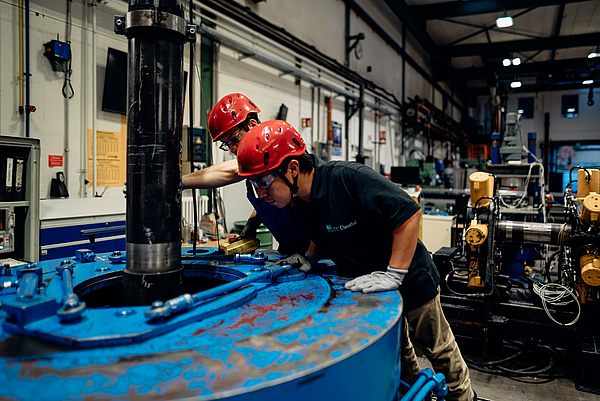Energy and Raw-Materials
Operating at the intersections of structural transformation and the shift to green energy, of globalization and import dependency, supplies of energy and raw-materials are one of the major challenges of the coming decades – not just for Germany, but also for Europe and ultimately the entire world. Students in the bachelor’s program in energy and raw-materials acquire a broad foundation of knowledge, strongly focused on practical application, in the natural sciences, engineering, and economics to equip them to tackle and solve complex problems. With these fundamental skills, graduates are qualified for a variety of jobs in the public, private, and research sectors that have arisen through the profound changes that are underway.
Jobs and careers
Global energy demand increases by a significant percentage each year. The same is true of demand for a variety of metals and other mineral resources. Within just a few years, current methods and technologies will no longer be sufficient to meet this need. That is why massive technological progress in all areas of energy and raw-materials extraction and use, as well as a change in the mindset of society as a whole, is needed for the protection and sustainable use of our planet’s resources. As a technologically advanced country, Germany is taking a leading role in the introduction and implementation of the necessary measures. This has created high demand for well-trained specialists among the large number of corporate groups, companies, and service providers, as well as public bodies and research facilities, in the energy and raw-materials sector. These specialists perform a very broad range of roles.
Possible fields
- The building-materials and mining industry
- Mineral and waste processing and recycling
- Energy production and distribution companies
- Drilling operations
- Petroleum companies
- Natural-gas supply and storage operations
- Design and engineering firms
- Municipal water and energy supply
- Public bodies and universities
Why Clausthal?
TU Clausthal has a strong tradition in the study of mineral geology and energy and materials science. These particular strengths provide an excellent environment for teaching the latest scientific and technical knowledge for professional practice and further research. The bachelor’s program in energy and raw-materials draws on TU Clausthal’s broad range of courses. Through its pronounced focus on practical application, it offers graduates not only a first academic degree and professional qualification but also a sound l foundation for further university education in a master’s program in, for example, mining engineering, petroleum engineering, environmental process engineering, or power systems engineering.
Program structure
The bachelor’s program in energy and raw-materials is divided into two areas of focus:
- Energy and raw-materials supply engineering
- Petroleum engineering
These two areas share a large number of identical foundational modules in engineering and the natural sciences, as well as business administration and law. Building on these foundations, each focus has its own specialized modules. A number of electives are offered alongside compulsory modules so that students can deepen their knowledge or specialize in a particular area.
Focus: Energy and Raw-Materials Supply Engineering
- Natural sciences and geology
- Extraction technology in opencast and deep mining
- Processing technology
- Surveying
- Soil and rock mechanics
- Occupational safety and health
- Mining and environmental law
- Business administration
- Data processing and information technology
Focus: Petroleum Engineering
- Natural sciences and geology
- Deep-drilling technology
- Oil and gas reservoir technology
- Oil and gas production
- Oil and gas extraction technology
- Geothermal energy
- Occupational safety and health
- Mining and environmental law
- Business administration
- Data processing and information technology
Industrial placement
In total, eight weeks must be spent in industrial placements. Each student is to complete a four-week basic internship before starting the program. It is possible to request an extension of that deadline until the beginning of the third semester at the latest. The four-week industrial placement can be completed during the semester break.

Focus Energy and Raw-Materials Supply Engineering
Prof. Dr.-Ing. Hossein Tudeshki
Phone: +49 5323 72-2225
Fax: +49 5323 72-2371
E-Mail: ba.ervt@tu-clausthal.de
Institute of Mining
Erzstraße 20
38678 Clausthal-Zellerfeld
http://www.rohstoffingenieur.de/
Focus Petroleum Engineering
Bettina Jenei
Phone: +49 5323 72-2068
Fax: +49 5323 72-3146
E-Mail: bettina.jenei@tu-clausthal.de
Institute of Subsurface Energy Systems
Agricolastraße 10
38678 Clausthal-Zellerfeld
Overview
Type: Bachelor's degree course Duration: 6 semesters Language of instruction: German and English Degree: Bachelor of Science (B.Sc.) Admission requirements: University entrance qualification Start date: last possible application and enrolment for summer semester 2022!!! Accreditation: Certificate ASIIN accredited for the phase-out operation until 30.09.2027
FAQ
Answers to frequently asked questions on the website of the Institute of Subsurface Energy Systems.
Other programs that may interest you
Power Systems Technologies
Geoenviromental Engineering
Follow-on Master's programs
Mining Engineering
Petroleum Engineering
Power Systems Engineering
Environmental Process Engineering and Recycling
Documents
Prüfungsordnungen
- Allgemeine Prüfungsordnung
- General Exam Regulations
- Ausführungsbestimmungen - ab WS 15/16
- Executive Regulations - winterterm 2015/16
Praktikumsbestimmungen
Wahlpflichtkataloge
- aktueller Wahlpflichtkatalog WS 22/23 und SS 23_update 21.06.2022
- aktueller Wahlpflichtkatalog WS 23/24 und SS 24_update 13.06.2023
Modellstudienpläne
- Modellstudienplan SR Energie-und Rohstoffversorgungstechnik
- Modellstudienplan SR Petroleum Engineering
Modulhandbücher
Techniker2Bachelor
![[Translate to English:] [Translate to English:]](/fileadmin/_processed_/9/1/csm_Beachvolleyball_1_1a8913aa18.jpg)
